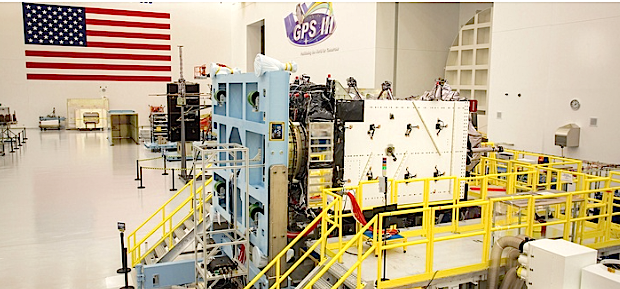The U.S. military and intelligence community’s appetite for satellites and associated gear is growing, and the coming reorganization dubbed Space Force may boost it further.

A GPS III satellite being built at a Lockheed Martin factory in Colorado. Harris builds the satellite's navigation payload.
Leaders of Harris said they are already seeing an uptick in spending, mostly for classified space projects, as the military buys new satellites and ground control stations that are better protected from Russian and Chinese attacks.
“Our classified business in space has been very, very strong,” Harris CEO Bill Brown said Tuesday during a quarterly earnings call. “We see this momentum continuing with several new wins in the second quarter that are extend[ing] our positions on existing programs as well as create new franchises that will have significant follow-on opportunities.”
Harris, which has historically supplied components to larger manufacturers like Lockheed Martin, is now doing more solo work: building and selling small satellites. Some of the small projects are moving beyond one-off proof-of-concept missions. (Harris and L3 Technologies are planning to merge in mid-2019.)
“In our small satellite franchise, we received awards of more than $350 million over the past three years to develop and produce 17 satellites with five different customers as we move from pathfinder missions to to building a full constellation in space,” Brown said.
Harris CFO Rahul Ghai said “better-than-expected growth in classified programs” prompted Harris to increase revenue projections for its space and intelligence business.
Brown said sales have grown not just of satellites, but also of ground stations and “other parts of different domains that we participate in.”
“The trends have been very, very good,” he said. “We had a really good start, orders are good, the pipeline is very strong in that business. We’ve had good success in growing our small sat franchise.”
Moreover, Brown said, the company’s investments in new satellite, ground station, and communications technology has paid off.
“Certainly the initial work we’ve done on hosted payloads, we did some investments to get ahead of the curve on small sats, are now paying dividends,” he said. “It’s not just with one customer. It’s multiple customers both in the [intelligence community] as well as in DoD. It’s all good news.”
By Marcus Weisgerber for Defense One

